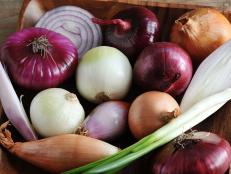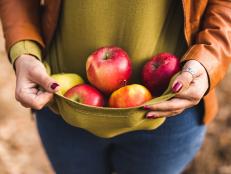Should You Eat a Lectin-Free Diet?
Lectins are found in a variety of healthy foods, but they can get a bad rap. Here's what you need to know before going lectin-free.

5PH/Getty Images
Known as antinutrients, lectins are found in many plant foods and, when eaten raw, can interfere with intestinal absorption, and can cause an upset stomach. For some people, following a lectin-free diet may seem like the right move, but it's not a fit for everyone. Here’s what the nutrition science says about lectins and a lectin-free diet.
What are lectins in food?
Plants contain several defense mechanisms; one appears to be lectins which can help ward off predators through antibacterial, antiviral, antifungal, and anti-insect activity. When large amounts of raw lectin-containing plants are eaten by animals and humans, they can quickly cause severe stomach pain, vomiting, other intestinal distress, likely leading to avoidance by those predators. However, we humans can cook foods containing lectins, which decreases the lectin content to very small amounts.
Lectins are found in the following raw foods:
- Legumes: lentils, soybeans, kidney beans, lima beans, string beans, sugar snap peas, and others
- Whole grains: wheat, barley, rice, barley and others
- Nuts/seeds: sunflower seeds, peanuts, walnuts, coconuts, and others
- Vegetables: mushrooms; carrots; beets; garlic; the cucurbits family including zucchini, summer squash, and cucumbers; nightshades like eggplant, tomatoes, and potatoes; and others
- Fruits: blackberries, cherries, watermelon, cantaloupe, grapes, apples, bananas, grapefruit, papaya and others
Are lectins healthy?
The foods above including whole grains, legumes, fruits and vegetables are recommended by medical and nutrition professionals for health and for disease prevention. These foods contain antioxidants, fiber, and important nutrients. Legumes (beans, peas, peanuts, and lentils) contain some of the highest levels of lectins of all the foods on the list; and eating a serving of legumes daily can significantly reduce the risk of heart disease.
Many of the foods containing lectins are eaten cooked. Lectins are inactivated by cooking, particularly by moist cooking like boiling and steaming. Dry heat like roasting can also destroy lectins, especially if cooked for 30 minutes or more. Lectins can survive in beans that are undercooked, sometimes leading to symptoms that mimic food poisoning.
People who have tummy troubles after eating some lectin-containing foods may have a lectin intolerance and can simply cook those foods longer or try boiling/steaming them. For example, canned chickpeas can be heated (in the microwave with a little oil and some dried herbs for extra flavor!) and then cooled before adding to salads or making hummus. Or try eating nut butters (which are heat-processed) if certain nuts cause stomach discomfort.
Do you need to follow a lectin-free diet?
The developers of diets like Whole30 and Paleo mandate lectin avoidance and propose that lectins are the cause of autoimmune diseases, systemic inflammation, gut issues and more, though most of those claims aren’t backed by evidence-based research.
Avoiding lectins could also lead to deficiency of important nutrients. Lectin-containing foods like whole grains and legumes contain nutrients many Americans don’t eat enough of, like potassium, magnesium, and fiber. Whole grains are linked to lower heart disease, cancer rates, and decreased mortality. The story is similar for those people who eat lentils, beans, peanuts, and other legumes several times a week.
Additionally, whole grains, legumes, carrots, potatoes, and other lectin-containing foods are some of the most budget-friendly foods around.
What are potential benefits of lectins?
Eating a variety of lectin-containing foods means eating foods rich in fiber and prebiotics which can contribute to gut health. A healthy gut is linked to decreased inflammation and risk of diabetes, obesity, gut issues (IBS, IBD), colorectal cancer and depression.
Lectins are an ongoing area of nutrition research and there is much to discover about their impact on health, but researchers are publishing promising studies. For example, the PNA, the main lectin in some legumes is associated with suppression of tumor development in mice. Additionally lectins found in some plants have been shown to effectively inhibit HIV. And lectins from bananas and plantains may bolster some aspects of immune function. More research needs to be done.
Bottom line: Avoiding lectin-containing foods could lead to a fairly restrictive diet.
Properly cooking lectin-containing foods can significantly decrease or remove lectins. Eating a variety of raw fruits and vegetables is associated with reduced inflammation and other associations with good health. Completely removing lectin-containing foods from meals would lead to a fairly restrictive diet. It would mean eliminating most grain-based foods, lots of fruits and vegetables, and lentils – which are a nutrient-dense food containing carbohydrates, fats, proteins, and a whole list of micronutrients. People who eat more legumes and whole grains are at lower risk for heart disease, cancer, and brain degeneration.
Serena Ball, MS, RD is a registered dietitian nutritionist, food writer, and mom of five children. She blogs at TeaspoonOfSpice.com and is the author of the best-selling The 30-Minute Mediterranean Diet Cookbook and the newly released Easy Everyday Mediterranean Diet Cookbook. Follow her @TspCurry on Twitter and Instagram.
Related Links:
































